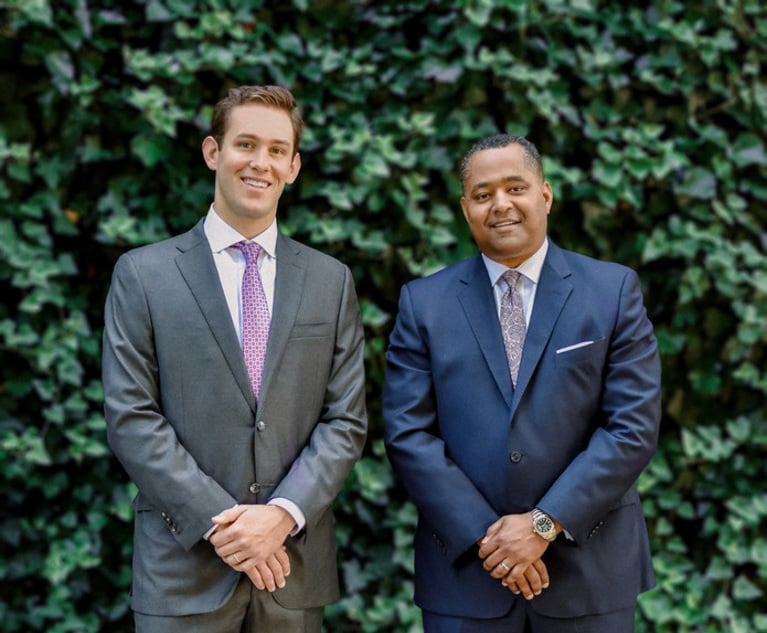Proceed With Caution: How E-Scooter Companies Can Protect Riders and Themselves
Waivers do not make companies bullet-proof. ... Louisiana and Virginia have refused to enforce such waivers due to public policy considerations, stating that e-Scooter users cannot sign away their rights with the push of a button.
July 11, 2019 at 12:03 PM
7 minute read
 Brannon J. Arnold, partner, Weinberg, Wheeler, Hudgins, Gunn & Dial. (Courtesy photo)
Brannon J. Arnold, partner, Weinberg, Wheeler, Hudgins, Gunn & Dial. (Courtesy photo)
Pay-per-minute e-scooters are now available on almost every street corner in every major city. Major e-scooter companies, like Bird and Lime, claim there have been over 120 million e-scooter rides in the U.S. in just over a year. As these e-scooters and vehicle sharing services become more popular, questions remain as to how companies can protect their riders and limit their own liability. Below are some best practices companies and manufacturers should follow to avoid this developing area of litigation.
Encourage Safe e-Scooter Use
Most scooter sharing companies are making safety their “top priority.” Many e-scooter manufacturers are constantly updating safety features so that they are easier and more secure to use. A few months ago, Lime released an upgraded model with extra back breaks and bigger wheels that “improve stability by increasing the scooter's grip on the road.” Additionally, Lime's newest e-scooters now have LED screens that detect and alert riders when they are riding on sidewalks or when the riders improperly park the e-scooter. Other companies and manufacturers should be in tune with how their products are used and should strive to produce a safe and cost-effective product for their users.
In addition to building safer e-scooters, companies are encouraging safe practices while riding. For example, major companies instruct riders to avoid alcohol or one-handed driving. Most e-scooter companies provide educational videos, instructional pages and in-app messages to ensure riders know and abide by applicable rules. Riders are advised to operate scooters on the road in bike lanes as opposed to sidewalks and advised to wear helmets during operation. Recognizing that most riders do not have helmets, some e-scooter companies mail free helmets upon request or provide free helmets at disbursement locations throughout the city.
Finally, companies should consider interacting with the public to encourage best practices. For example, Bird launched a global safety advisory committee focusing on both rider and pedestrian safety. Companies like Lime and CitiBike have made efforts to emphasize safety as well.
Just last month, Bird announced plans to visit over 100 cities this summer along with road safety experts to showcase the safe road fundamentals for non-car users. At these events, Bird has promised to distribute free helmets, tutorials of local rules and best parking practices. Similarly, Lime provides tips to car drivers on how to be more aware of all road users, including pedestrians, cyclists and e-scooter riders.
Adopt Specific Contract Provisions
One of the strongest ways that vehicle-sharing companies can limit their liability is to include specific contractual provisions in their “terms of service.” E-scooter users are generally required to sign liability releases, class action waivers, assumption-of-risk waivers and arbitration clauses when renting such equipment. However, waivers do not make companies bullet-proof. Each jurisdiction has its own legal framework for determining the enforceability of these waivers. For example, the states of Louisiana and Virginia have refused to enforce such waivers due to public policy considerations, stating that e-scooter users cannot sign away their rights with the push of a button. See La. Civ. Code Ann. art. 2004 (1985); Hiett v. Lake Barcroft Community Assoc., 418 S.E.2d 894, 895–96 (Va. 1992). Other states, like California, Florida and New Jersey, will not enforce liability waivers in favor of a commercial entity that fails to comply with any safety regulation associated with the activity. Cal. Civ. Code §1668 (West 2018); Torres v. Offshore Professional Tour, Inc., 629 So. 2d. 192, 194 (Fla. Dist. Ct. App. 1993); Stelluti v. Casapenn Enters., LLC, 203 N.J. 286, 304 (N.J. 2010). In Georgia, attorneys have argued that courts should find these waivers unenforceable against public policy because they force people to give up rights to vital public transportation services and access to public rights of way. Georgia courts have yet to rule on these issues.
Engage with Local and State Governments
Companies should also become involved with local and state Department of Transportation officials to increase road safety and move cities away from being car centric. According to several studies, there is a correlation between the quantity of e-scooter injuries and the friendliness of a city towards non-car road users. Accordingly, many Georgia e-scooter companies have taken steps to increase road safety for their users. For example, Bird actively donates to cities to create protected bike lanes to increase both sidewalk and e-scooter safety.
Companies should also consider partnering with local governments to create specific e-scooter parking. To minimize accidents, some e-scooter companies, such as Bird, are rolling out designated e-scooter parking. For several years, other micro-mobility vehicle sharing companies, such as e-bikes, have obtained designated parking spaces, but e-scooters do not yet have these in most major cities. While part of an e-scooter's appeal is being able to access them anywhere, designated parking would decrease the risk of third-party injuries that can occur while tripping or crashing into e-scooters strewn on sidewalks (or often, in the street).
While there are obviously instances in which litigation is advisable or unavoidable, if companies follow these basic tips, they may have a better chance at preventing and resolving disputes.
My e-Scooting Experience
While writing this article, I decided to try an e-scooter for the first time. After downloading the app, I quickly found an e-scooter outside my building. I was surprised by the number of screens I had to go through before I could actually ride the scooter. For example, after accepting the terms and conditions, the app provided interactive and step-by-step infographics on how to safely use the scooter. The handlebar also had a sticker reminding users to wear a helmet and not to ride on the sidewalk. It took me just a few minutes to get the hang of riding the scooter. To start the scooter, I had to kick off three times and then push the throttle button, which only works if the scooter is already moving. When I ended my ride a few minutes later, the app required me to take a photograph of the parked scooter to ensure it was in an area that would not impede a public right of way.
In sum, I was ultimately surprised by how many safety features the e-scooter had, both in the virtual app and in its physical design. While e-scooter companies and manufacturers continue to strive to improve the safety of these devices, users must not forget that they, too, have a duty to exercise ordinary care during operation. Both are required, if Atlantans want continued access to e-scooters.
Brannon Arnold is an Atlanta-based partner at Weinberg Wheeler Hudgins Gunn & Dial. She focuses her practice on civil litigation with an emphasis on product liability, catastrophic injury and professional liability.
This content has been archived. It is available through our partners, LexisNexis® and Bloomberg Law.
To view this content, please continue to their sites.
Not a Lexis Subscriber?
Subscribe Now
Not a Bloomberg Law Subscriber?
Subscribe Now
NOT FOR REPRINT
© 2025 ALM Global, LLC, All Rights Reserved. Request academic re-use from www.copyright.com. All other uses, submit a request to [email protected]. For more information visit Asset & Logo Licensing.
You Might Like
View All
Atlanta Attorneys Rely on Google Earth, YouTube for Evidence in $6M Faulty Guardrail Settlement

Fowler White Burnett Opens Jacksonville Office Focused on Transportation Practice
3 minute read
'A Fierce Battle of Expert Witnesses' Expected in Cybersecurity Spat
Trending Stories
- 1Uber Files RICO Suit Against Plaintiff-Side Firms Alleging Fraudulent Injury Claims
- 2The Law Firm Disrupted: Scrutinizing the Elephant More Than the Mouse
- 3Inherent Diminished Value Damages Unavailable to 3rd-Party Claimants, Court Says
- 4Pa. Defense Firm Sued by Client Over Ex-Eagles Player's $43.5M Med Mal Win
- 5Losses Mount at Morris Manning, but Departing Ex-Chair Stays Bullish About His Old Firm's Future
Who Got The Work
J. Brugh Lower of Gibbons has entered an appearance for industrial equipment supplier Devco Corporation in a pending trademark infringement lawsuit. The suit, accusing the defendant of selling knock-off Graco products, was filed Dec. 18 in New Jersey District Court by Rivkin Radler on behalf of Graco Inc. and Graco Minnesota. The case, assigned to U.S. District Judge Zahid N. Quraishi, is 3:24-cv-11294, Graco Inc. et al v. Devco Corporation.
Who Got The Work
Rebecca Maller-Stein and Kent A. Yalowitz of Arnold & Porter Kaye Scholer have entered their appearances for Hanaco Venture Capital and its executives, Lior Prosor and David Frankel, in a pending securities lawsuit. The action, filed on Dec. 24 in New York Southern District Court by Zell, Aron & Co. on behalf of Goldeneye Advisors, accuses the defendants of negligently and fraudulently managing the plaintiff's $1 million investment. The case, assigned to U.S. District Judge Vernon S. Broderick, is 1:24-cv-09918, Goldeneye Advisors, LLC v. Hanaco Venture Capital, Ltd. et al.
Who Got The Work
Attorneys from A&O Shearman has stepped in as defense counsel for Toronto-Dominion Bank and other defendants in a pending securities class action. The suit, filed Dec. 11 in New York Southern District Court by Bleichmar Fonti & Auld, accuses the defendants of concealing the bank's 'pervasive' deficiencies in regards to its compliance with the Bank Secrecy Act and the quality of its anti-money laundering controls. The case, assigned to U.S. District Judge Arun Subramanian, is 1:24-cv-09445, Gonzalez v. The Toronto-Dominion Bank et al.
Who Got The Work
Crown Castle International, a Pennsylvania company providing shared communications infrastructure, has turned to Luke D. Wolf of Gordon Rees Scully Mansukhani to fend off a pending breach-of-contract lawsuit. The court action, filed Nov. 25 in Michigan Eastern District Court by Hooper Hathaway PC on behalf of The Town Residences LLC, accuses Crown Castle of failing to transfer approximately $30,000 in utility payments from T-Mobile in breach of a roof-top lease and assignment agreement. The case, assigned to U.S. District Judge Susan K. Declercq, is 2:24-cv-13131, The Town Residences LLC v. T-Mobile US, Inc. et al.
Who Got The Work
Wilfred P. Coronato and Daniel M. Schwartz of McCarter & English have stepped in as defense counsel to Electrolux Home Products Inc. in a pending product liability lawsuit. The court action, filed Nov. 26 in New York Eastern District Court by Poulos Lopiccolo PC and Nagel Rice LLP on behalf of David Stern, alleges that the defendant's refrigerators’ drawers and shelving repeatedly break and fall apart within months after purchase. The case, assigned to U.S. District Judge Joan M. Azrack, is 2:24-cv-08204, Stern v. Electrolux Home Products, Inc.
Featured Firms
Law Offices of Gary Martin Hays & Associates, P.C.
(470) 294-1674
Law Offices of Mark E. Salomone
(857) 444-6468
Smith & Hassler
(713) 739-1250







